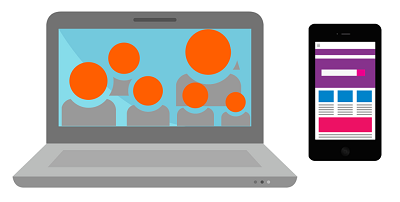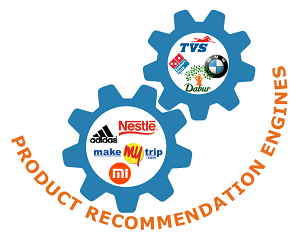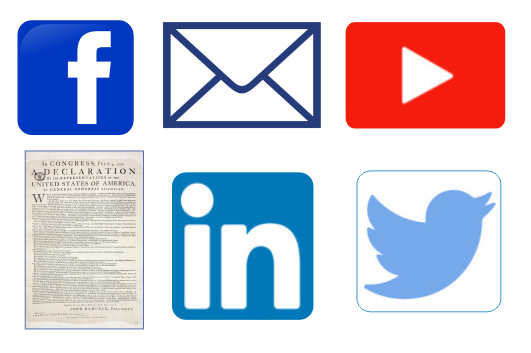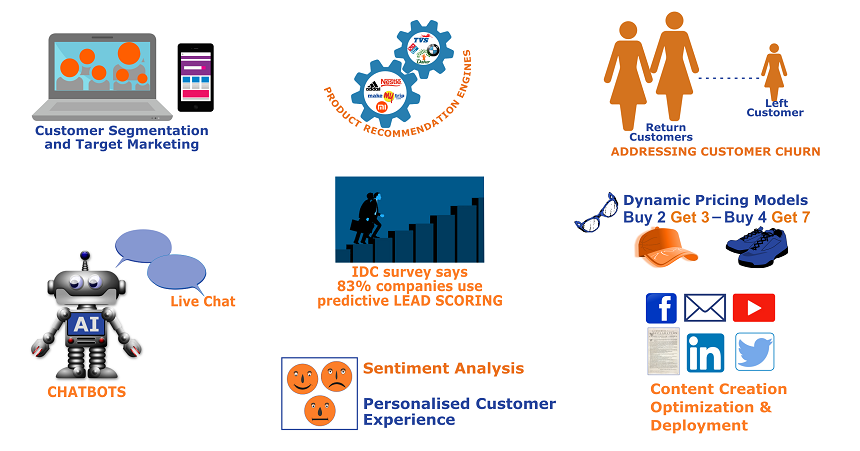Artificial Intelligence and Machine Learning have changed the way businesses interact with customers. Marketing has always been customer centric and anything that doesn’t please your customer or target audience is not saleable in the market. Thus, to keep the marketing efforts on target, make it personalized and maximize customer base, businesses are using AI and ML technologies. They are doing so by collecting online and offline customer data to measure their future actions. All the gathered data allows businesses to target audiences with the appropriate message at the right time through the relevant marketing channel to create a buyer’s journey and move them through the marketing funnel. AI and ML in marketing help in analyzing and interpreting customer data leading to more significant conversions. This article talks of 8 best use cases for Machine Learning and AI in marketing.
Companies like Google, Amazon, and Microsoft Azure have launched Machine learning platforms on cloud that have made AI and ML prominent in recent years. AI was already there, and we didn’t notice it. The ‘Spam’ folder our email carries is an excellent example of using AI. Gmail identifies specific/selected words to filter out spam emails. Another example is automatic tagging or image recognition technique used by Facebook that recognizes ‘Photos’ or ‘Face’ in the social media platform.
 Marketers are alert more than ever before. They are marking customer’s every step and designing marketing activities around them. They are listening to what customers say, they are seeing what customers see and speaking what customer speak on the various channels and using the most modern technologies like AI and ML.
Marketers are alert more than ever before. They are marking customer’s every step and designing marketing activities around them. They are listening to what customers say, they are seeing what customers see and speaking what customer speak on the various channels and using the most modern technologies like AI and ML.
Some key benefits of AI and ML in Marketing:
- Identifies Buyer’s Journey: AI and ML use algorithms to understand customer query and try to find out the exact solution that best suits the query. In this process, it seeks to identify the Buyer and tracks his/her path and looks after the entire journey.
- Unlimited consumption of Data: ML unknowingly captures unlimited data that can be used to review and modify marketing activities and build new effective strategies based on customer requirements and behavioral patterns.
- Predicts Customer Behavior: Every business has internal systems that collect customer data point that help them understand how the customer perceives their brand. AI helps in predicting the future actions of the customer based on the past data collected. It forecasts customer behavior and predicts if he/she will stay or leave. It even predicts how a customer reacts to new trends or events based on historical data.
- Streamlines Marketing Campaigns: AI helps in streamlining the marketing activities as it understands which marketing channels work best for the company, and that increases the overall customer base.
- Better Customer Retention Activities: When a lead becomes a customer, the marketing activities should focus on retaining them by offering more specific services that keep them loyal to your brand. And AI does precisely this by understanding the customer touch points well and delivering the results.
Top 8 Uses cases for ML and AI in Marketing:
 AI and ML help marketers to segment the customer base into different categories and help them to target the right audience with the right message. Segmentation helps the marketer to answer some trivial questions like which customer segments are profitable, and which are the channels that can yield better ROI. It also allows marketers to differentiate customers on the basis of location, spending ability, specific channels customers use to approach the brand and, etc. The Recency Frequency and Monitory (RFM) is a method followed by most marketers globally to segment the customers in different groups. Segmentation allows marketers to send customized and contextual messages to customers on specific occasions like birthdays or events.
AI and ML help marketers to segment the customer base into different categories and help them to target the right audience with the right message. Segmentation helps the marketer to answer some trivial questions like which customer segments are profitable, and which are the channels that can yield better ROI. It also allows marketers to differentiate customers on the basis of location, spending ability, specific channels customers use to approach the brand and, etc. The Recency Frequency and Monitory (RFM) is a method followed by most marketers globally to segment the customers in different groups. Segmentation allows marketers to send customized and contextual messages to customers on specific occasions like birthdays or events.
 Have you ever imagined the product recommendations you get on Google, Amazon and other search engines! There are various product recommendation algorithms that work behind these engines. The product recommendation engines work based on the customer last purchase and suggests products relating to it. For example: if a customer purchases a laptop, then the recommendation engine would give recommendations like a laptop bag, laptop cover, a charger, and any other relating products. Thus, the recommendation engines identify customer buying requirements and groups all the relating products in one category and later send suggestions enabling upsell and cross-sell.
Have you ever imagined the product recommendations you get on Google, Amazon and other search engines! There are various product recommendation algorithms that work behind these engines. The product recommendation engines work based on the customer last purchase and suggests products relating to it. For example: if a customer purchases a laptop, then the recommendation engine would give recommendations like a laptop bag, laptop cover, a charger, and any other relating products. Thus, the recommendation engines identify customer buying requirements and groups all the relating products in one category and later send suggestions enabling upsell and cross-sell.
AI helps in improved Lead Scoring that allows ranking customers on a scale representing specific values they add to the company. Lead scoring helps companies to prioritize lead generation strategies. Different tracking metrics used by marketers to monitor customer behavior and track website visited, number of emails opened, downloads and clicks done. Lead scoring also involves a customer’s social score that includes accounts they follow, posts they like and ads they engage with.
A business is termed successful when customers come back for purchase. Customer churn is different for different industries. For an ecommerce industry customer churn is defined as, “customers who haven’t purchased within a specific period of time.”Companies should always have a higher number of new customers than the churn rate. For example: a company can define a cutoff date of 90 days from last purchase made. The main focus is on the retention of customers through campaigns that are specifically targeted towards them and help them in return. Companies now use different customer churn models to identify customer churn rates.
Offering various discounts, freebies, coupons have been age-old techniques used by marketers to attract customers. Having a dynamic pricing strategy allows the marketer to offer flexible prices for the products and services they offer. With this kind of pricing model, prices can be differently set for a different customer as per their purchasing history with minimum alterations in the pricing structure.
AI helps achieve hyper-personalization as it influences a customer’s journey from content creation to customer service. From emails to discounts to product suggestions, everything could be personalized. ML helps in creating a more human-like experience. 1:1 personalization is necessary to retain the customers.
Chatbots have proved to be a considerable boon AI has ever produced for enhanced customer service. They speak as humans and are available 24/7, allowing customer care personnel to focus on more complex issues. Live chats have showed increased customer satisfaction levels. Using sentiment analysis chatbot can identify a customer’s mood behind the message and can reply accordingly. Machine Learning enables chatbots to have more personalized conversations with customers and understand their requirements. Customer need not wait for longer time as they get quick replies from the bots.
 AI can help build automated content for several web pages and apps like auto-response messages, supportive replies on social media pages, and responses to product/service enquiry. Thus, AI saves a huge amount of man-hours as it can easily manage this ongoing and repetitive content. A/B Testing is a method under machine learning used by marketers for content optimization. It allows marketers to try various options – be it email subject, social media graphic ads, article title A/B Testing proves to be a perfect tool to try and test options. AI helps in determining the specific words customers responds to and enables marketers to create more tailor-made messages. Every single message marketed to you has a complex algorithm working behind it that better understand your needs.
AI can help build automated content for several web pages and apps like auto-response messages, supportive replies on social media pages, and responses to product/service enquiry. Thus, AI saves a huge amount of man-hours as it can easily manage this ongoing and repetitive content. A/B Testing is a method under machine learning used by marketers for content optimization. It allows marketers to try various options – be it email subject, social media graphic ads, article title A/B Testing proves to be a perfect tool to try and test options. AI helps in determining the specific words customers responds to and enables marketers to create more tailor-made messages. Every single message marketed to you has a complex algorithm working behind it that better understand your needs.
AI and ML help marketers in knowing what type of content, through which channel and when to send to the customers. Every customer has personal tastes and choices. And, remembering customer preferences has become easy with the help of AI and ML. All these use cases make AI and ML one of the most significant digital innovations produced by mankind. The traditional tasks that were carried out by humans can now be automated using AI and ML algorithms that help in carrying out evidence-based actions.
Now business can build a base of a loyal audience that trusts your brand and will return to purchase more products and services. Hyper-Personalization has become an essential aspect of marketing without which it will be difficult for a marketer to reach the customer. As a result, start investing in AI and ML today; otherwise you may lose a customer the very next minute!

